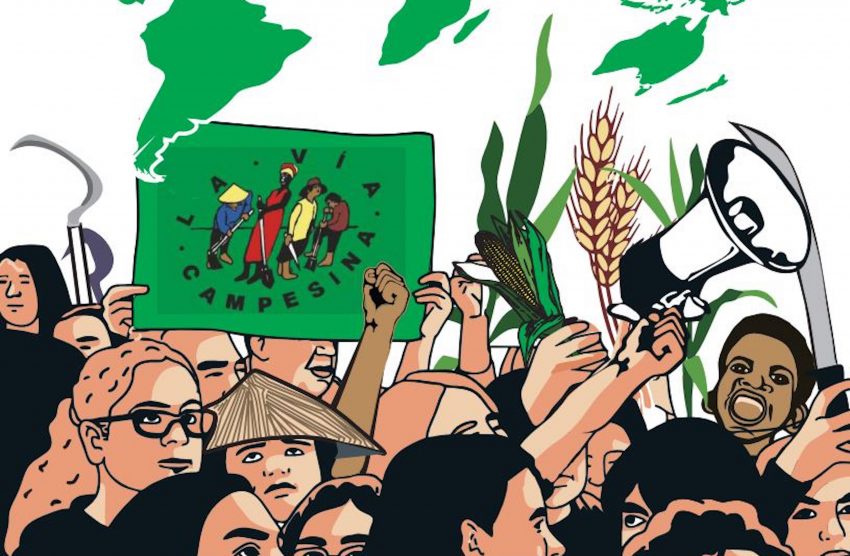09 October 2019: Over the last few months, La Via Campesina has stepped up its efforts globally to ensure that the member states of United Nations are committed to implementing the UN Declaration on the Rights of Peasants and Other People Working in Rural Areas (UNDROP), which was adopted by the UN in December last year.
Since May 2019, representatives of the global peasant movement have been lobbying hard inside the United Nations General Assembly, the UN Human Rights Council and also at the Food and Agricultural Organisation, to create an international momentum that favours and promotes the implementation of the Rights of Peasants.

While speaking at the SDG Summit, during the High-level Political Forum (HLPF) under the 74th Session of the General Assembly in New York on 26th September, Paula Gioia of La Via Campesina insisted upon the promotion, use and application of the UN Peasants Rights’ Declaration by all governments, while reminding everyone in the room that peasant led agroecology and sustainable peasant farming, offer concrete pathways to achieve several of the 17 sustainable development goals.
“To achieve zero hunger, food production must be based on agroecology and food sovereignty, embracing small-scale food producers.”, she said in her speech.
Also Read: Letter from the President of the UN General Assembly to La Via Campesina
The adoption of the UN Declaration on the Rights of Peasants and Other People Working in Rural Areas (UNDROP) by the UN Human Rights Council and later on by the UN General Assembly (December 2018), came at a perfect time for it to become a significant contribution to the UN Decade of Family Farming (UN DFF, 2019–2028) – a framework that promotes public policies in support of family farmers.

‘The Decade’ was officially launched at the Food and Agriculture Organisation of the United Nations (FAO) on the 29th of May this year. At the launch event, while calling for the ‘Decade of Family Farming’ to keep the interests of peasants and small holder food producers at its centre, Edgardo Garcia from La Via Campesina had said, “For us, the Decade is a space to promote the social change we have always demanded for people, workers and peasants. If governments listen to these demands, peasants will have their rights guaranteed and will be able to produce. If they don’t, it’ll be clear that the governments, FAO and IFAD will be placing agribusiness at the centre of the Decade. The link between the Peasants’ Rights Declaration and the Decade of Family Farming must be reflected into policies, consultations and recognition of organisations while implementing the Decade.”
La Via Campesina firmly believes that linking the contents of the UNDROP to the framework of the UN Decade of Family Farming will enhance the efforts to achieve Sustainable Development Goals and that through agroecological methods of food production the world can eradicate poverty, food insecurity and malnutrition.
As the first anniversary of the adoption of UNDROP approaches, La Via Campesina is taking this message of social transformation to all international governance spaces.

At a side event held at Palais des Nations on 23rd September, which looked at the opportunities that UNDROP opens up and also the challenges that lay ahead in its implementation, Zainal Arifin Fuat of La Via Campesina said, “…the historical adoption by the Council and the UN General Assembly represents a momentum for the international community to address inequality and discrimination which disproportionately touches the rural population worldwide. As stated in the UN General Assembly resolution 73/165, the Governments, agencies and organizations of the United Nations system, especially the Human Rights Council (HCR), and intergovernmental and non-governmental organizations, have to disseminate the Declaration and to promote universal respect and understanding thereof.”
This side event was co-organised by the Plurinational State of Bolivia, Switzerland, FAO, The Office of the United Nations High Commissioner for Human Rights (OHCHR) and La Via Campesina with the support of FIAN International and Centre Europe – Tiers Monde (CETIM).
Zainal also added that “after the adoption, a new phase of implementation shall be part of our common agendas, as a process where peasants, Member States and UN bodies should cooperate in addressing those matters. It is key that this process of implementation has to be lead on all levels, on the national, regional and international.”
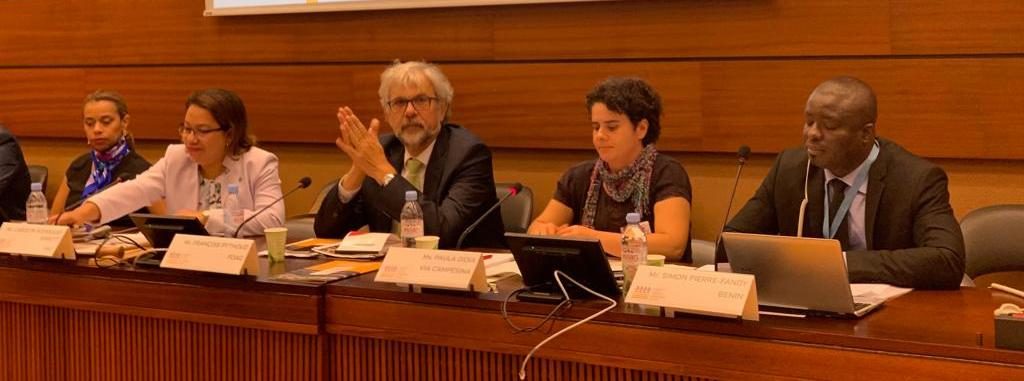
At another public event in Palais des Nations Geneva on the 3rd of October held to mark the launch of the UN Decade of Family Farming in Geneva, La Via Campesina once again highlighted that peasants and indigenous communities are primary agents of change, yet are often marginalised and dispossessed of their fundamental rights – such as the right to land, to water, and to seeds.
While speaking on behalf of the global peasant movement, Paula Gioia demanded for a strong human rights approach in the process of implementation of the UN Decade.
“The Decade provide us an excellent opportunity to work together on the promotion, use and application of food security and human rights related instruments, which will contribute directly to the support of family farming. At a time when we are witnessing a systematic side-lining of Human Rights, it is even more important to join forces. Member States’ Missions, UN agencies, as well as Civil Society organizations based in Geneva need to play a big role in that”, she said.
In addition to the global push, La Via Campesina – through its member organisations – is holding several national and regional forums, calling for national policies that protect the rights of peasants and other people working in rural areas.
In the Americas, at the beginning of this year, this political instrument was officially launched in countries such as Honduras, Colombia and Paraguay; Argentina, plans to do the same in November this year.
Also, during the VII Congress of the Latin American Coordination of Rural Organizations held in Cuba in June, members of Via Campesina strategised on implementing the Declaration at the continental level. Former Director General of FAO, Graziano da Silva, who also participated in the Congress said “this historic declaration will protect the rights of rural populations, including peasants and indigenous peoples, recognizing their challenges and also acknowledging their potential contribution to sustainable development. FAO must work for the recognition of the rights of rural people, because we are sure that only understanding and respecting them will lead us to a better future for our rural areas.”
Several organizations in Honduras have jointly articulated a campaign called #CultivarSinRiesgo that seeks the urgent attention of the government and the rest of Honduran society to the crises in agriculture. “There is food insecurity, there is no good winter, there is repression, there is climate change and hunger, among other difficulties,” said Rafael Alegría.
Furthermore, in August, the UN Human Rights Committee blamed the State of Paraguay for one death and 20 intoxicated people in a rural town in 2011. This was the first time that it mentioned the Declaration of Peasant Rights approved in 2018.
On the other hand, this year also the Movement of Landless Rural Workers, MST of Brazil, used the Declaration to initiate a Cooperation with the Federal Office of Citizens’ Rights in Pará to develop strategies and solutions against violence in the countryside, and to monitor and follow up on accusations of violence against the peasantry. This region, more than 20 years ago, was the victim of the so-called Eldorado dos Carajas Massacre, where 19 landless people were assassinated with impunity, and due to this fact La Via Campesina commemorates April 17 as a global Day of Peasant Struggle.
In Europe, at the end of September, the European Coordination Via Campesina (ECVC) organised debates and internal exchanges involving representatives of peasant organizations, allied organizations and academics. The activities culminated with a public conference in the European Economic and Social Committee (EESC), during which several representatives of the European Commission as well from FAO REU and the OHCHR based in Brussels participated.
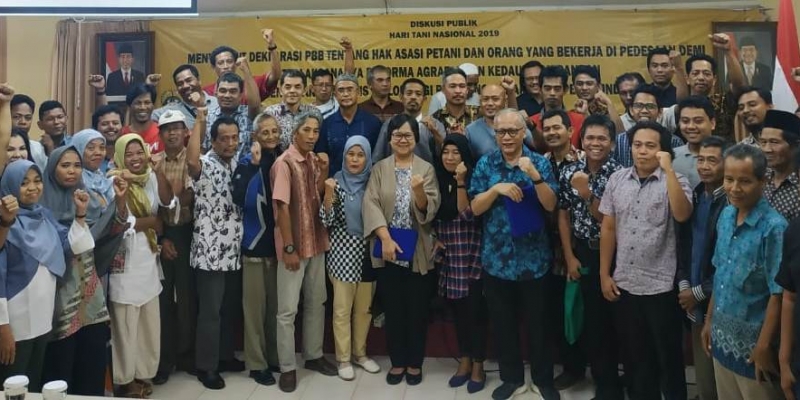
In Indonesia a public event was held on 26 September where members of the Indonesian Peasants Union (SPI) as well as academics looked that road map ahead in implementation of the Declaration in the country. The peasants’ union has already called upon the government to harmonise the proposed amendments to the land law in line with the UN Declaration.
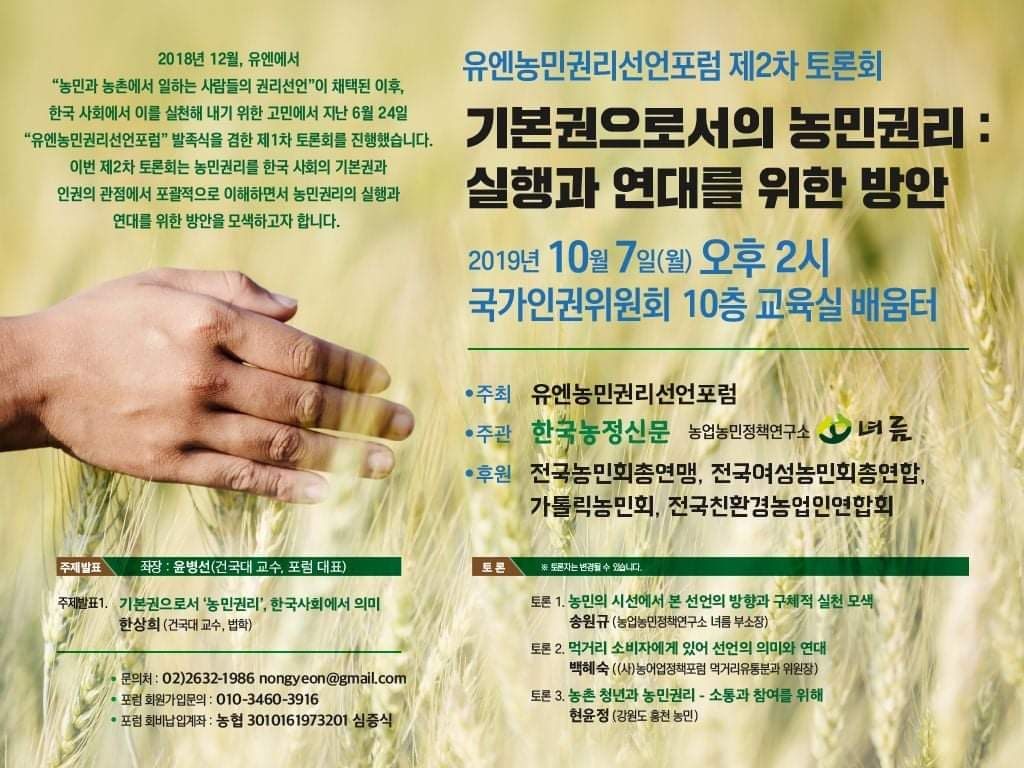
In South Korea a forum on UNDROP was set up in early June this year and the second meeting of this forum took place this October at the National Human Rights Commission of Korea, where academics, researchers and members of the civil society joined the peasant movements in Korea to devise a strategy for the implementation of peasants rights in the country.
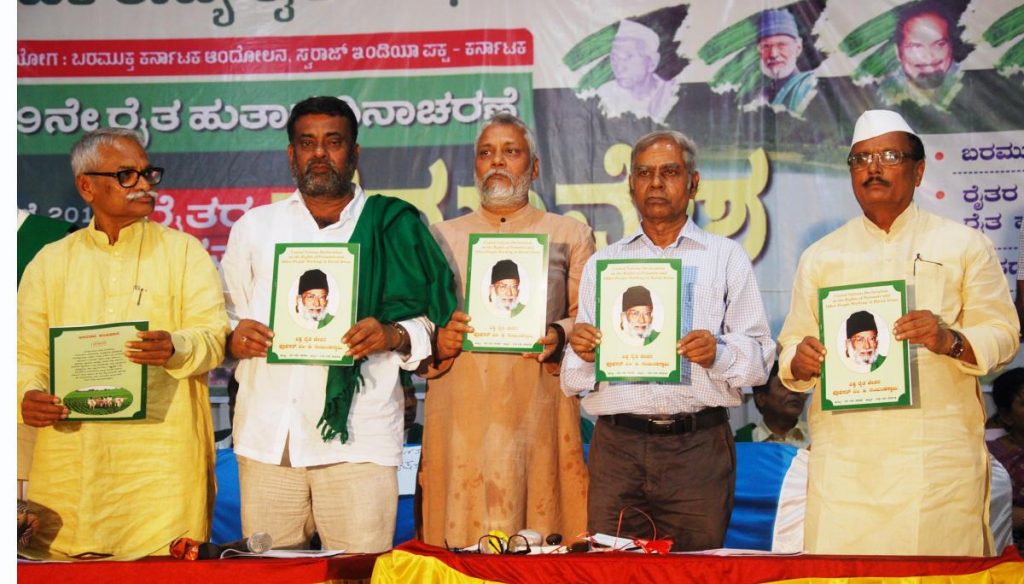
In India, the Karnataka Rajya Raitha Sangha is now translating the UN Declaration into Kannada. At a public event held in July, prominent lawyers and leaders of the peasant movement called upon the government to use the Declaration as a reference for better public policies, while introducing the contents of the Declaration to the peasants in the State.

In Pakistan, this October, the Pakistan Kisan Rabita Committee introduced the UN Declaration at a public meeting of 20 peasant organisations from Punjab, KPK and Sindh regions of the country. A summarised version of the UN Declaration in Urdu was also released at the meeting.
For the global peasant movement, the adoption of this Declaration by the UN last December, is only a battle half won. What is crucial now is the path the member states of the UN will take, in making the contents of this Declaration become a lived reality for millions of rural families. Unless the UN Declaration is implemented in full letter and spirit in all countries of the world, this struggle goes on.

